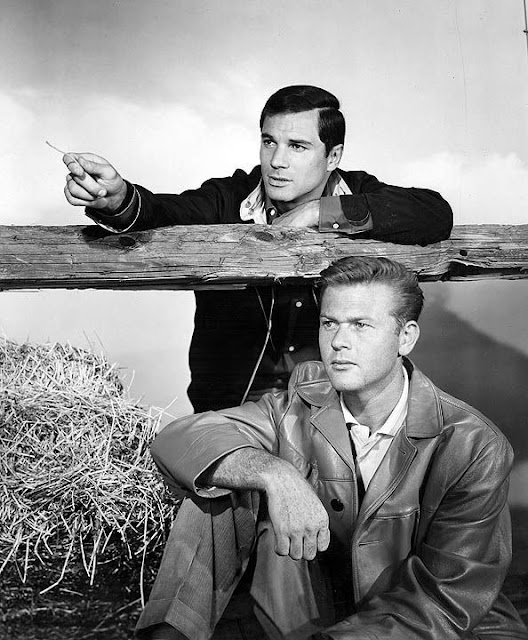UPDATED BLOG POST: George Maharis died at home in Beverly Hills on May 24, 2023. He was 94 years old.
Hollywood actor George Maharis (b. 1928) was arrested November 21, 1974 and charged with committing a sex act with a male hairdresser in the men's room of a gas station in Los Angeles. 46 years old at the time, Maharis was booked on a sex perversion charge and released on $500 bail. Six years earlier Maharis had been arrested by a vice squad officer for lewd conduct in the restroom of a Hollywood restaurant; the officer said Maharis made a pass at him.
Well, now that we have that out of the way...
Best known for his role as Buz Murdock on the hit 1960s CBS television series Route 66, Maharis had just posed nude for Playgirl magazine the year before his 1974 arrest. Route 66 was a 1960-1964 series about two guys and a Corvette who roamed the country together – often dressed in coats and ties, for no apparent reason. I kid you not. Maharis received an Emmy nomination for this role in 1962. However, Maharis left the wildly popular show before it ended its run, and there has been much speculation as to why.
Maharis told the story that he had contracted infectious hepatitis in 1962, and that the shoots were so grueling that to continue would risk his health. He asked the producers to give him a less arduous schedule, but they refused, and he left the show, to be replaced by Glenn Corbett in the role of Lincoln Case. However, others relate a different scenario. Route 66 producer Herbert B. Leonard found out that Maharis was gay and was having a hard time keeping his star’s sexual activities away from the press. Maharis also used the illness, Leonard said, as an excuse to break his contract so that he could get into movies. Co-star Martin Milner (in the role of Tod) and a Route 66 writer-producer confirm this version.
George Maharis & Martin Milner
Maharis eventually did break into movies, but they were all forgettable B-grade films. Maharis also played stage roles, but nothing ever matched his success as Buz on Route 66, and the TV show never recovered from Maharis’s departure.
According to Karen Blocher, who is working on a book about Maharis and has interviewed him for the project, the reality of why Maharis left Route 66 is a combination of the two. She writes, “The producers felt betrayed and duped when they learned of Maharis's sexual orientation, and never trusted him again. Maharis, for his part, started to feel that he was carrying the show and was going unappreciated. So when he got sick, and came back, and started griping about the working conditions, the producers assumed it was all a ploy to either get more money or else get out of his contract and go make movies. In a less homophobic era, they might have communicated better, and worked things out instead of letting each other down.”
Maharis also had a singing career, releasing seven albums between the years 1962 and 1966, a time period that overlapped his appearance on Route 66. Maharis regularly appeared in Las Vegas nightclubs during the 1980s. Video below.
Here’s a complete Route 66 one-hour episode from early 1962.







